PLANT PEST
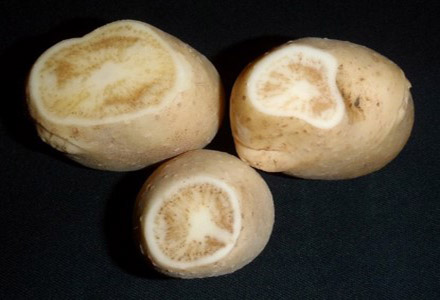
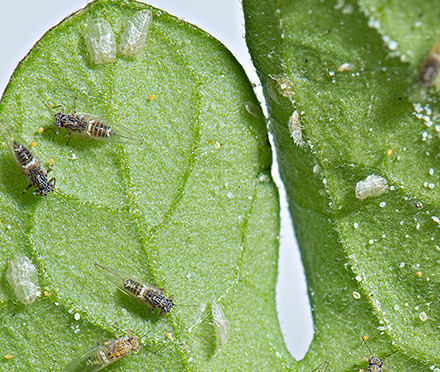
‘Candidatus Liberibacter solanacearum’ complex, including zebra chip
Exotic to Australia, one insect vector under management in WA
Features: Bacterial diseases, spread by the tiny psyllids, that causes stunted or abnormal growth in vegetable crops, including striping in potatoes
Where it's from: Central America, South America and North America, Europe, North Africa, Israel and New Zealand
How it spreads: Importation of infected plants and plant material or infected tomato-potato psyllids; local spread by infected psyllids
At risk: Crops including potato, tomato, carrot, capsicum and chillies
Keep it out
Zebra chip is caused by a bacterial infection (Candidatus Liberibacter solanacearum) and an insect, the tiny tomato-potato psyllid (Bactericera cockerelli), carries the disease from plant to plant.
Zebra chip damages plants and reduces yields of many important crops including potato, tomato, carrot and other vegetables. The name of the disease comes from the characteristic dark stripes that it causes in potato resulting in yield reductions and unmarketable produce.
This exotic disease has caused significant damage to farming in both New Zealand and the United States, costing the international potato industry millions of dollars, and it is feared that the same would happen in Australia.
Stop the spread
Australia is free of the disease-causing bacterium but one of the psyllids that carries it, tomato potato psyllid, is now present in Western Australia. It was found there in March 2017, and since then, movements of anything, such as vegetables, that could spread it to the rest of the country have been banned.
Information on interstate movement restrictions are on the Interstate Quarantine website.
The tomato potato psyllid that came into WA from overseas was not infected with the disease-causing bacteria, but next time we might not be so lucky.
Importing goods
To keep zebra chip and related bacterium strains out of Australia, never ignore Australia’s strict biosecurity rules.
Import shipments may need to be treated and certified, so before you import, check our Biosecurity Import Conditions system (BICON).
What to look for
Look out for symptoms of the disease, and if you live outside of WA look for the tomato potato psyllid.
The disease causes symptoms of:
- yellowing and/or purpling of leaves
- stunted or abnormal growth
- stem canker (ulcers)
- wilting of leaves.
In potatoes:
- dark blotches or stripes.
In carrots and tomatoes:
- leaf curling
- yellowing and/or purpling of leaves
- stunting of roots.
In capsicum and chillies:
- leaves turn pale green or yellow with spiky tips
- stunting of leaves
- plant death.
The tomato potato psyllid is a sap sucking insect that resembles a miniature cicada. It grows to about 3 mm long and is brown in colour with a broad white band on the abdomen.
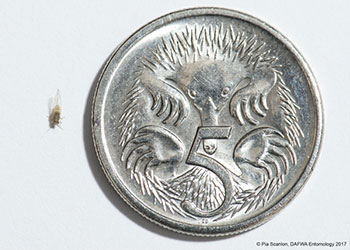
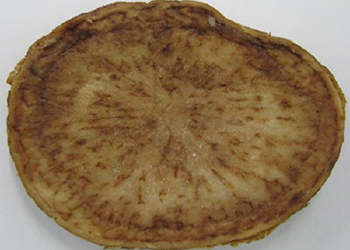
Where to look
Importers
Imported plant material poses the greatest risk of the bacterial disease and the tomato potato psyllid making it to Australia.
Growers and home gardeners
Look for disease symptoms and, if you live outside of WA, the tomato potato psyllid in:
- potato
- tomato
- capsicum
- carrots
- eggplant
- celery.
Once potatoes are cut, the disease can be easily distinguished. If they are fried, striped patterns of discoloration will be evident in the potato tubers, and potato chips will taste and look burnt.
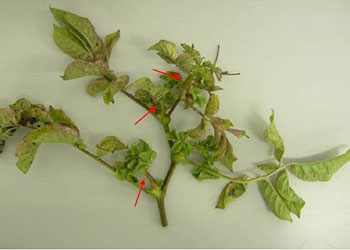
What to do
If you think you’ve found the tomato potato psyllid outside of Western Australia, or signs of zebra chip:
- take a photo
- contain the material or insect (this may be as simple as closing the doors on a shipping container or preventing access to a field).
Read the detail
- Tomato potato psyllid in Western Australia
- The zebra chip bacteria and symptoms on plants
- Risk assessment: Potatoes from New Zealand
- Pest risk analysis for 'Candidatus Liberibacter solanacearum' associated with apiaceous crops
- Plant Health Australia: zebra chip resources
- Plant Health Australia: zebra chip in potato
